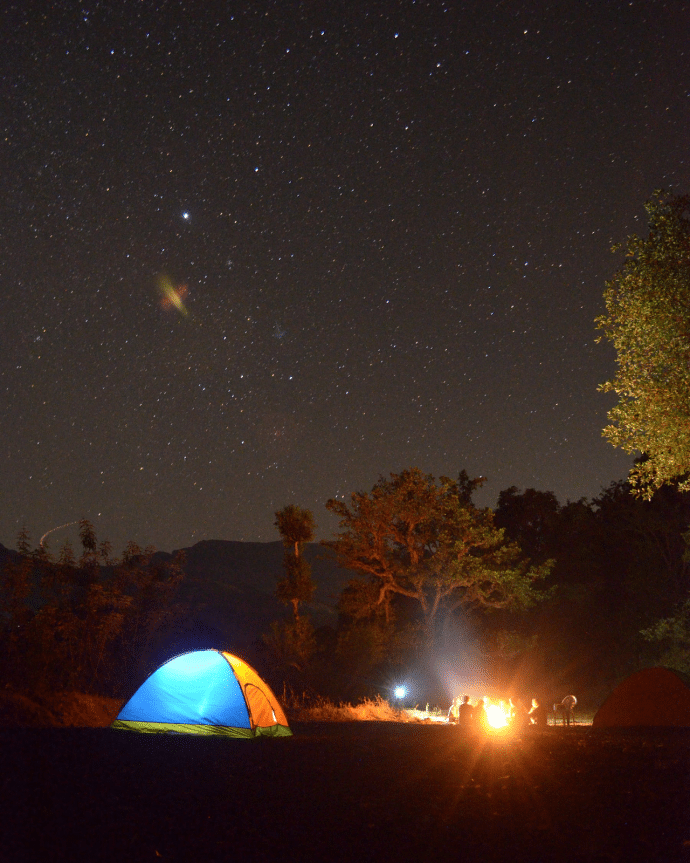Image Credit: Pexels
Camping is one of the best ways to disconnect with reality and get in tune with nature. There’s something about the crackle from the campfire, fresh outdoor air, and a perfect view of the stars that puts you at peace and rejuvenates your body and mind. However, there are a few things to worry about when you’re camping, such as storms, wildlife, and other dangers that the wilderness may hold. Enjoy a stress-free camping vacation and plan ahead to stay safe on your weekend trip to the woods. Here are a few issues to be concerned about on your next adventure and some ways to stay safe while enjoying your camping trip.
Check the weather
Weather can be unpredictable, but with modern technology, big storms can be somewhat anticipated ahead of time. Camping out in a tent during a storm can be uncomfortable if you’re soaking wet and confined to a tiny waterproof tent, but it can also be dangerous. Keep an eye on alerts for things such as tornado warnings, thunder and lightning, and flash floods. It may be best to stay home if a big storm is about to hit. If you’re worried about just a bit of rain, consider renting an RV for your journey instead of pitching a tent. Finding an RV in Canada is easy and can be a safe, dry place to sleep if your nights look rainy.
Stay aware
Especially when traveling with children, it is important to be aware of your surroundings when you’re out in the wilderness. Stay away from cliffs and other treacherous areas, as you may wake up in the night to use the “bathroom” but be unable to see unsafe conditions in the dark. You also want to familiarize yourself with the wildlife you might encounter and keep your campsite away from hazards such as snake nests.
Know the wildlife
As mentioned, there may be a lot of creatures in the woods you’re not familiar with. One of the biggest wildlife threats that campers should be concerned with is bears. Make sure your food is stored in your vehicle or in a bear-proof cooler. Change your clothes before bed so any food scents from cooking are not carried with you into the tent. If you’re worried about encountering a bear on your journey, pick up some bear spray before your trip and keep it with you in case of emergency. It is always better to be safe than sorry!
Pack appropriately
In addition to your bear spray, pick up a few of the basics before heading out into the woods. Bug repellent will keep you bite-free on your camping trip, and sunscreen will prevent uncomfortable sunburn while you’re out in the wilderness. If you’re going to be hiking or swimming, make sure you pack the appropriate clothing. The nights might be cold, so make sure you include warm gear as well as shorts and t-shirts for the hot, sunny days. You’ll also need to pack things for preparing food, starting a fire, and sleeping comfortably. Make a list before you hit the road and be sure you have all of the necessities.
Prevent sunburn
As mentioned before, sunblock is one of the most important basics to pack on your next camping trip. Sunburn can not only make your trip extremely uncomfortable, but if you’re out in the sun too long, you could become severely ill. Stay protected from UV rays and pack sunscreen with SPF 15 or higher.
Stay hydrated
One of the most important things you need on a daily basis is clean water, and this is even more important while camping. After hiking, swimming, and exploring all day, your body will need tons of water to stay hydrated. You can’t always count on clean water while you’re out in the woods, so packing jugs of emergency water is an easy way to make sure you have as much water as you’ll need. Drink even if you don’t feel thirsty, as we are often dehydrated before the symptoms hit.
Choose your campsite wisely
If you’re going to be out and about exploring, you want to make sure your campsite is in a safe location. If you have little ones along for the trip, you don’t want to pick an area with dangerous cliffs or bodies of water. Plan on hiking up to the campsite? Choose a site your entire group can enjoy, regardless of physical limitations. It won’t be fun for everyone if your group is sore and exhausted.
Practice fire safety
Novice campers and wilderness buffs alike are at risk when a campfire is inappropriately handled. Build your fire away from trees hanging low to the ground, and keep fabrics and children away from the flame. Make sure someone is tending to the fire at all times and be certain it is completely dowsed before heading off to bed for the night.
Know your plants
The woods can hold some dangerous plants, such as poison ivy or oak. Educate yourself (and your little ones early on) to know the difference from these plants and other, safer ones. Do not pick anything out of the woods to eat, such as berries or mushrooms. Unless you are an expert in wilderness survival, you don’t want to risk ingesting something poisonous.
Be prepared
It’s important to anticipate any of these issues and prepare yourself for any issues you might run into. Pack a first-aid kid, take safety precautions, and don’t wander far from your group. Bring along maps and understand the layout of your campsite. Stay educated about the risks involved, but don’t let your fears keep you from relaxing on your vacation into the wilderness.

